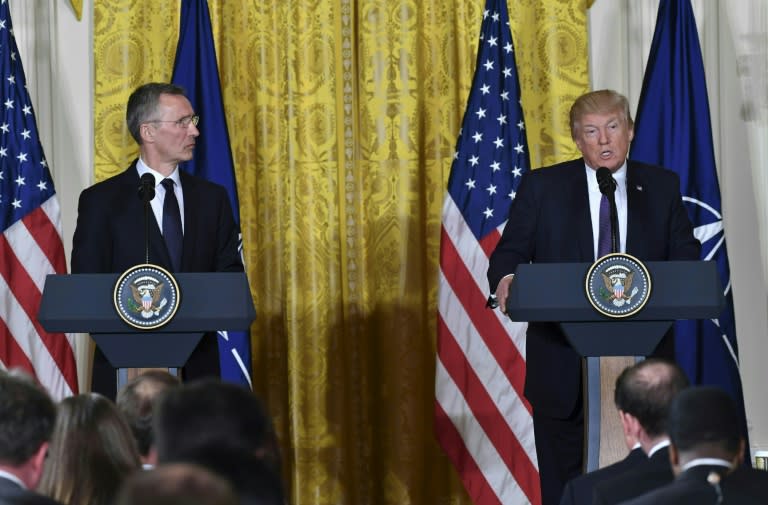US wants to get past rift with Russia amid Syria impasse
The United States wants to improve ties with Russia from their current "all-time low" over Syria, President Donald Trump said Wednesday, as Moscow dug in to defend its ally in Damascus. Standing side-by-side with NATO's Secretary General Jens Stoltenberg at the White House, Trump said: "It would be wonderful... if NATO and our country could get along with Russia." But that prospect appeared remote, with Trump's secretary of state Rex Tillerson getting a frosty reception in Moscow, and Russia using its UN Security Council veto to swat down a US-backed resolution demanding Syrian cooperation in probing last week's suspected chemical attack. "Right now, we're not getting along with Russia at all -- we may be at an all-time low in terms of our relationship with Russia," Trump admitted. Moscow has accused the United States of breaking international law by striking Syria with 59 Tomahawk cruise missiles in what Trump said was retaliation for the chemical attack on a rebel-held town attributed to the Syrian regime of President Bashar al-Assad. Trump has given such criticism short shrift, decrying the "vicious slaughter of innocent civilians with chemical weapons" and calling Assad a "butcher" and an "animal." "I felt we had to do something about it. I have absolutely no doubt we did the right thing," he said. He added it was "certainly possible" that Moscow knew about the alleged chemical attack, indicating Russian officials were present at the source airbase that Trump later bombed. Earlier, Trump boasted in an interview with Fox Business television that the order to launch the missiles was given as he and visiting Chinese President Xi Jinping were digging into chocolate cake at his Florida resort. He called the US military action "genius," and stated that Xi, too, "was OK with it." - Rapprochement dashed - Russian President Vladimir Putin made his displeasure felt as he hosted Tillerson at the Kremlin. "There is a low level of trust between our two countries. The world's two foremost nuclear powers cannot have this kind of relationship," Tillerson -- who once received a medal of friendship from Putin -- told a Moscow news conference. Russian Foreign Minister Sergei Lavrov agreed there were many problems, but stressed that Moscow was "open to dialogue with the US in all different areas." He noted a shared vision of an "uncompromising" war on terrorism. But neither side cited concrete avenues of cooperation, beyond establishing a working group to address what Tillerson called "smaller issues." Trump had spoken warmly of Russia on the campaign trail, raising Moscow's hopes of some sort of rapprochement. But since Trump came to office in January, relations have chilled, and the fallout from the alleged chemical weapons attack in Syria has thrown them into crisis. Putin accused Assad's opponents of planning to stage chemical attacks to be blamed on Damascus in order to lure the United States deeper into the conflict. The polarized positions were evident at the UN Security Council on Wednesday, when Russia vetoed a Western-drafted resolution that would have required Syrian cooperation in an investigation into the suspected chemical attack. It was the eighth time that Russia has used its veto power to block action directed at Damascus. China opted to abstain, a move Trump praised. British Foreign Secretary Boris Johnson said the veto "puts Russia on the wrong side of the argument," while French President Francois Hollande warned Russia it "bears a heavy responsibility" for continuing to protect Assad. "After today's vote to hold Syria accountable it's: A strong day for the US, a weak day for Russia, a new day for China & doomsday for Assad," the US ambassador to the UN, Nikki Haley, said on Twitter. - Litany of issues - Undaunted by Russia's veto, Trump called on US allies to "work together to resolve the disaster" in Syria and thanked them for condemning Assad's suspected sarin attack in the town of Khan Sheikhun, which killed 87 civilians. Even if the US and Russia were able to quell the festering antagonism over Syria, other issues are fraying relations. They include -- as Tillerson mentioned in Moscow -- a US belief that Russian hackers and propagandists interfered in the US presidential election. A senior US administration official speaking on condition of anonymity also said the White House has seen credible reports that Moscow backed an election-day attack in Montenegro last year. There are also lingering differences over Russia's 2014 annexation of Ukraine's Crimea and Russian involvement with pro-Russian rebels fighting Ukrainian troops in the east of the country. Russia, in turn, is concerned about NATO's presence in eastern Europe along its border. That preoccupation sharpened on Tuesday when Trump signed off on Montenegro's long-expected accession to the North Atlantic Treaty Organization. The US leader has backed away from campaign rhetoric that NATO was obsolete, saying Wednesday that he now viewed it as the "bulwark" for international security. But he renewed his demand that NATO's members boost military spending to at least two percent of gross domestic product. Lavrov, sitting next to Tillerson in Moscow, said many of the divisions between Russia and the US were the result of "time bombs" left behind by former president Barack Obama. Putin, in a television interview ahead of the talks, was more blunt about the new chill in ties, and firmly rejected Washington's view of the Syrian attack. In a sign the Kremlin is not ready to drop Assad, Syria's foreign minister will fly to Moscow to meet Lavrov on Thursday before a three-way meeting with Iran on Friday.





